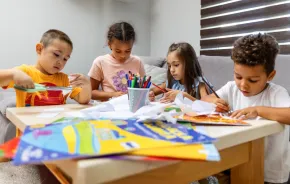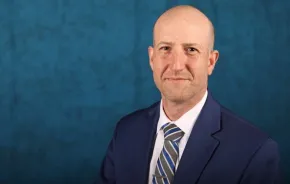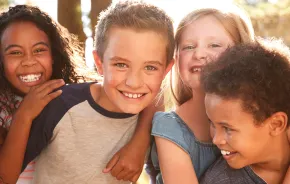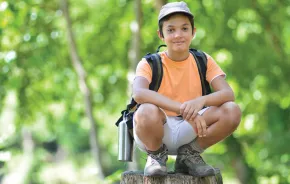If you’ve noticed conversations about global warming heating up lately, you’re not imagining things. The Intergovernmental Panel on Climate Change (IPCC) recently released a report for policymakers declaring, once and for all, that the world is warming, and if we don’t change our ways, we’ll be in big trouble. (You can read the report at www.ipcc.ch. Go to Working Group II Report: "Impacts, Adaptation and Vulnerability," and click Summary for Policymakers to download the pdf.)
For parents, hearing the news about global warming can be especially scary. You might wonder: How will I help my child cope with climate change? How will I introduce the topic without causing nightmares? Moreover, how will I equip my kid to change the world and save the planet?
Take comfort — we’re all in this together. Experts worldwide are working with legislators to enact policies to slow global warming and help minimize its impact. And many energy consumers like you are choosing to treat the situation as an opportunity for positive change. As a parent, you can start by staying informed, talking honestly with your child and (of course) turning off the water while you brush.
Know the facts
Before answering your child’s questions about climate change, learn the facts. Patrick Mazza, father of 10-year-old Erika, and research director for Climate Solutions, a Northwest nonprofit organization focused on climate change, offers this summary:
• Global temperatures have reached levels that are near or equal to the hottest we’ve seen since the end of the last Ice Age, 10,000 years ago. “Scientists have come to the consensus that human fossil-fuel consumption is the cause of most of this warming,” Mazza says. The reason is that fossil-fuel emissions generate heat-trapping gases that essentially thicken the earth’s atmosphere and trap solar radiation.
• Global warming triggers a whole series of changes in the system of oceans and atmosphere in which we live. Impacts: extreme storms and floods, drought, famine, wild fires, species migrating toward the poles, tropical diseases spreading northward, and sea levels rising, threatening populated coastal areas.
“The most serious impact we’ll see in Washington is the loss of our snow pack,” Mazza says. Snow pack supports municipal water supply, irrigation, hydro-electric power, salmon runs, and forest health. “The Northwest we love — that of forests and snowcapped mountains and salmon and wide rivers — is at stake.”
The happy news: Changes we all make will create a better world; they’ll improve air pollution, create jobs, and improve international relations, Mazza says. Read about changes you can make at www.nrdc.org.
How to talk to your kids
Dr. Liliana Lengua, a mother of three and a University of Washington associate professor of psychology who specializes in children’s social and emotional development, offers these ideas for talking to your kids about climate change:
Preschoolers: Talk about protecting the earth. “Even if it’s just teaching them to use the back of the paper,” Lengua says. “By making environmental health part of your daily conversation, it’s a more natural way to bring them into the issue.” Leave out the negative details, she says.
School-age children: “Use [conservation] actions as jumping points for the next level of discussion: what is happening,” Lengua says. Expect tougher questions as your child’s thinking becomes more sophisticated and scientific. It’s OK to give partial answers, Dr. Lengua says. “Even a metaphorical answer can be as good for a child as a hard truth. They understand nurturing. That kind of metaphor can help them get their heads around the issue in a developmentally appropriate way.”
With kids ages 6 and older, Dr. Lengua recommends talking honestly while providing reassurance, such as: “There are organizations doing good work” and “These are the things we can do as a family.”
Pre-teens and teens: “Older children hear the news, but it’s still useful for parents to talk about the things that can be done now, and strategies [kids] can get involved in personally, such as donating money or writing congressional leaders,” suggests Dr. Lengua.
To open a dialogue:
• Ask, “What have you been hearing in school and in the media?” Or, “Did you hear about this news?” If the child seems not to know anything, ask, “What do you think about this?”
• Ask if they’re doing anything on their own or at school that relates to climate change.
• Bring up something you’re doing to help with the problem.
• Next time your child forgets to turn off a light or a faucet, ask them if they know why it’s important.
• Address the situation as a family. Make a checklist of things everyone can do. (Look for ideas in the April and July issues of ParentMap.)
Natasha Petroff is a Snohomish-based writer and editor. She counts two biological children and one bonus child. This is for them.









